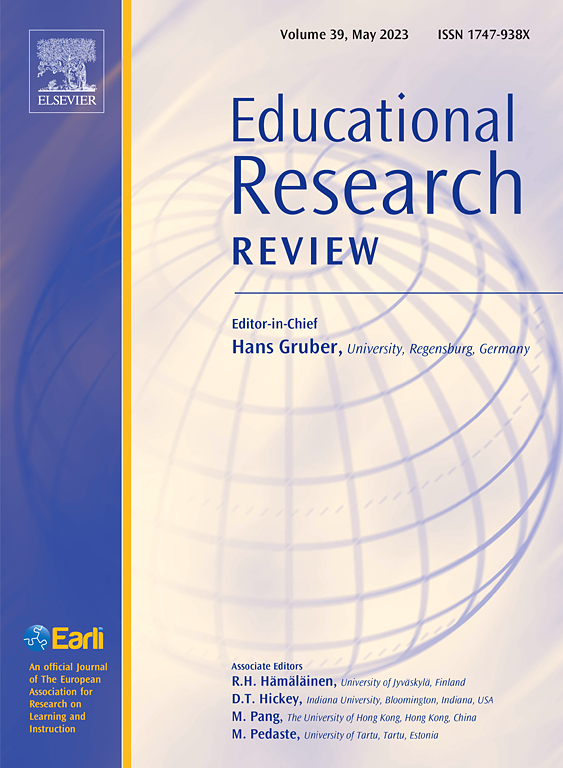视频学习中的主动学习策略:一个元分析
IF 10.6
1区 教育学
Q1 EDUCATION & EDUCATIONAL RESEARCH
引用次数: 0
摘要
嵌入在视频内容中的主动学习策略已经成为增强学习者教育体验的重要工具。然而,关于它们的有效性,文献提供了不同的结果。在本研究中,我们进行了一系列的荟萃分析来评估主动学习策略对学习者动机、认知负荷和学习绩效的影响。根据我们的标准,纳入了46篇文章,包括54项比较主动策略和被动视频观看的研究。大多数研究(74%)是在2019年至2025年之间进行的,主要关注成年人(93%)和STEM学科(75%),其中嵌入问题是最常见的策略(46%)。元分析结果显示,主动学习策略对学习绩效有显著的正向影响,包括记忆(k = 24, g = 0.33)、理解(k = 33, g = 0.28)和迁移(k = 24, g = 0.43),以及动机(k = 8, g = 0.15)和认知负荷(k = 19, g = 0.19)的增加。此外,我们的调节因子分析显示,学习者的特征(即年龄)和视频属性(即节奏,设置)显著影响与主动学习策略相关的结果。本研究以各种理论框架为基础,强调了主动学习策略在提高视频教育效率和质量方面的潜力。本文章由计算机程序翻译,如有差异,请以英文原文为准。
Active learning strategies in video learning: A meta-analysis
Active learning strategies embedded in video content have become increasingly prominent tools for enhancing learners' educational experiences. However, the literature offers varied results concerning their effectiveness. In this research, we conducted a series of meta-analyses to assess the influence of active learning strategies on learners' motivation, cognitive load, and learning performance. On the basis of our criteria, 46 articles were included, encompassing 54 studies comparing active strategies with passive video watching. Most of these studies (74 %) were conducted between 2019 and 2025 and focused primarily on adults (93 %) and STEM disciplines (75 %), with embedded questions being the most common strategy (46 %). The meta-analysis results revealed that active learning strategies had a significant positive effect on learning performance, including retention (k = 24, g = 0.33), comprehension (k = 33, g = 0.28) and transfer (k = 24, g = 0.43), and increased motivation (k = 8, g = 0.15) and cognitive load (k = 19, g = 0.19). Additionally, our moderator analysis revealed that learners’ characteristics (i.e., age) and video attributes (i.e., pace, setting) significantly influenced the outcomes associated with active learning strategies. This research, grounded in various theoretical frameworks, highlights the potential of active learning strategies to increase the efficiency and quality of video-based education.
求助全文
通过发布文献求助,成功后即可免费获取论文全文。
去求助
来源期刊

Educational Research Review
EDUCATION & EDUCATIONAL RESEARCH-
CiteScore
19.40
自引率
0.90%
发文量
53
审稿时长
57 days
期刊介绍:
Educational Research Review is an international journal catering to researchers and diverse agencies keen on reviewing studies and theoretical papers in education at any level. The journal welcomes high-quality articles that address educational research problems through a review approach, encompassing thematic or methodological reviews and meta-analyses. With an inclusive scope, the journal does not limit itself to any specific age range and invites articles across various settings where learning and education take place, such as schools, corporate training, and both formal and informal educational environments.
 求助内容:
求助内容: 应助结果提醒方式:
应助结果提醒方式:


